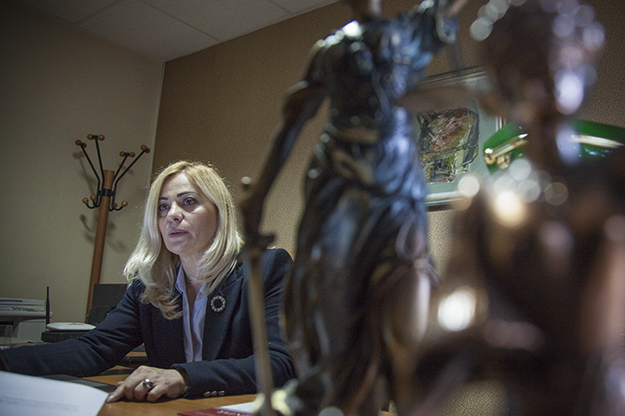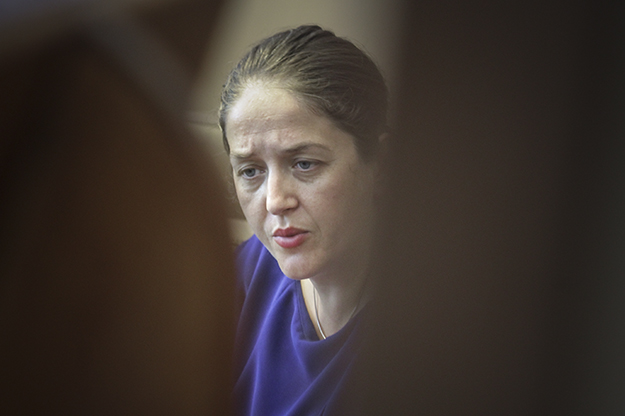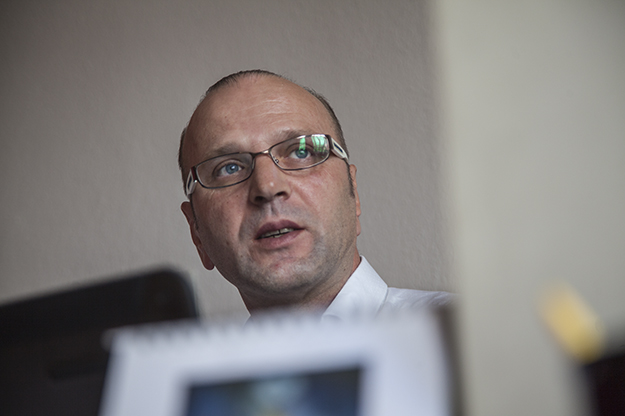Gender discrimination and bias in the division of property upon divorce in Kosovo could be on the way to being curtailed — at least in some parts of the country’s legislation.
In July, Kosovo Assembly passed the draft Law on Amending and Supplementing the Law on Family, which should soon move to a second reading. The new amendments are aimed at regulating the equal partition of property between partners during divorce court proceedings.
The amendments were initiated by Luljeta Aliu, an activist and executive director of Inject – Initiative for Justice and Equality, an NGO established to help empower marginalized groups. Triggered by her own personal experience during divorce proceedings, Aliu spent more than a year analyzing the legal gaps that enable the unequal distribution of marital assets.
By the end of 2017, after what she describes as a continuous examination of judicial practices and consultation with legal experts, Aliu had brought her proposed amendments to the Law on Family before the Assembly’s Committee on Legislation. The focal point of her demand was the “tantamount” recognition of the contribution of both partners during their lives together and a “clear specification of sharing property in two equal shares in case of separation.”
Progressive legislation?
The division of property between former spouses or partners is currently supposed to be carried out on an equal basis — at least on paper. Kosovo’s Constitution prevents discrimination through special articles and the adoption of international conventions, instruments that technically supercede specific articles of particular laws.
For instance, the United Nations Convention on the Elimination of All Forms of Discrimination Against Women guarantees equality in the justice system, and as such gender bias in rulings on property division should be inexistent.
Moreover, according to Teuta Beka, a lawyer with many years of experience in handling divorce settlements and who also lectures at the Juridica European College, even Kosovo’s existing Law on Family clearly defines that spouses are joint owners of shared property, unless they have agreed otherwise. Put simply, everything that was gained from the moment the two partners started living together should be shared in equal parts during divorce proceedings.
But Beka says that despite aiming to promote equality, the existing legislation provides a lot of space for different interpretations, leading to excessive discrimination in the courtrooms. Article 47 of the Law on Family defines “Joint Property” as property “acquired through work during the course of the marriage as well as income deriving from such property.”

Lawyer Teuta Beka says that existing legislation on rights to property in divorce proceedings leave space for various interpretations and that women are the ones who are losing out. Photo: Majlinda Hoxha / K2.0.
Legal experts say that non-specification of the wording “acquired through work during the marriage” leads judges to qualify it in terms of monetary income. Beka points out that Law on Family was not adapted to the needs and wellbeing of citizens.
“Article 47 of the Law on Family talks about ‘Joint Property’ without specifying clearly which spousal contributions are those that make up their joint property,” Beka says. “During judicial procedures it has been misinterpreted, which has ended up bringing about unfair rulings.”
Luljeta Demolli, executive director of the Kosovar Gender Studies Center, agrees that the current Law on Family doesn’t sufficiently recognize the principles of equality in marriage in relation to property and unpaid contributions to property.
“In most cases, women are excluded from their husbands’ houses [if they separate] because the properties are registered in the names of the husbands’ relatives,” Demolli says. “After the divorce, the wellbeing of women is more limited and opportunities aren’t available in the same way … that’s why the material contribution and that of family care need to be recognized as forms of wealth during divorce.”
Anton Nrecaj, legal adviser at Center for Legal Aid and Regional Development – CLARD, says that it is exactly this type of unpaid labor in the household that has continuously gone unacknowledged in court practices.
“Whether or not a person is in a workplace, unpaid labor needs to be calculated as equal to monetary income,” Nrecaj says. “There is no mention in law that you need to do this or that.”
Attempt to clarify value of unpaid labor
The unpaid work that Nrecaj refers to is increasingly finding its space in worldwide discussions on gender equality. Alternatively known as domestic work — as opposed to paid work — it is something that globally falls disproportionately to women.
A new UN report estimates that women do 2.6 times the amount of unpaid care and domestic work that men do, including childcare, cooking and cleaning, and even tasks such as picking up children from school or taking elderly parents to the doctor.
In Kosovo, with some figures indicating that just 13 percent of women are employed, women’s contributions to common households are overwhelmingly through unpaid labor. As a consequence, without having bills to show, lawyers say that judges tend to just share the property in favor of men.
Now though, Luljeta Aliu hopes that the new amendments to the Law on Family could help to ensure that courts begin to recognize unpaid work.

Luljeta Aliu initiated the current amendments to Kosovo’s Law on Family after her own personal experience of going through divorce proceedings. Photo: Majlinda Hoxha / K2.0.
The definition of ‘Joint Property’ as “property acquired through work during the course of the marriage” is set to be replaced with “property acquired through common contribution through the course of the marriage.” Aliu says that while she was analyzing court processes during her preparation of the new amendments she came to the conclusion that the words “work” and “contribution” were being used with different connotations.
“Until now judicial practices haven’t used them as synonyms. For me it was important to make it clear that there can’t be any difference in who was working,” Aliu says. “In case of disagreement the law splits the property in equal shares. That’s why unpaid labor needs to be taken into consideration. Not only the income from the man, but also the contribution for raising the children, education, the care toward the house and elderly people.”
In order to help ensure that unpaid labor is specifically recognized in the legislation, based on Aliu’s recommendations, Article 47 of the Law on Family is set to be extended to specify that joint property should be considered personal income, as well as assistance provided to the other spouse, such as childcare, the carrying out of housework, care and maintenance of property, as well as any other form of work and cooperation pertaining to the administration and increase of joint property.
Albulena Haxhiu, the Vetevendosje deputy who heads the Committee on Legislation, believes that the new amendments to the Law on Family will help to create mechanisms for the protection of women’s rights in Kosovo amidst a patriarchal mindset found even among judges.
“We are aware of the high unemployment rate and also that women and girls are mostly affected by this unemployment,” Haxhiu says. “In this regard we need to create mechanisms for women’s rights protection, exactly because of the patriarchal mindset that dominates in Kosovo.”
One part of the picture
While there appears to be broad support for the notion of ensuring that unpaid labor is recognized in law, there are those that urge caution not to believe that the steps being taken to amend this specific part of the Law on Family will in themself make conditions fairer for women.
Luljeta Demolli agrees with the need for unpaid labor to be recognized, but also believes that there needs to be a more wholesale approach to tackling the issues that lead to institutional discrimination against women. First and foremost, she says, these changes should be made in parallel with the creation of economic opportunities.
Demolli fears that any emphasis on recognizing unpaid labor that excludes the discussion on reducing unemployment might promote a stereotypical division of work. “It needs to be an equal share during marriage, and an equal share during divorce,” Demolli says. “The process of making amendments to the Law on Family needs to be more inclusive, principled and essential, in order for the division of labor not to be stereotypical and conservative and not to discriminate against women entering the labor market.”

Luljeta Demolli believes that attempts to ensure unpaid labor is properly recognized should not be treated in isolated from other structural inequalities facing women. Photo: Agan Kosumi.
She argues that without job opportunities women will be further encouraged to stay at home, as they will know that domestic work would be rewarded during any divorce proceedings.
Demolli also points to other areas of the Law on Family that she believes policy makers need to devote their attention to simultaneously. She highlights the need to clarify the right to same sex marriage — the Law on Family currently defines marriage as a “legally registered community of two persons of different sexes” — as well as to ensure adequate state welfare provisions are established for unpaid childcare contributions; current provisions oblige partner’s relatives, according to the line of hereditary succession, to provide alimony when an ex-spouse cannot.
“[Legislation] should not reflect patriarchal values that allow ‘blood line’ to be a more important factor than the creation of institutional mechanisms,” she says.
Haxhiu acknowledges the Law on Family has many flaws but says that at this stage the Committee on Legislation has dealt specifically with the recognition of the equal recognition of what each party has brought to the marriage, with the aim of looking at making other amendments soon.
“The Ministry of Justice has informed us that by January next year it will proceed with [making amendments to] the Civil Code, and since the Committee on Legislation is competent to also review this, we came to an agreement to deal with other issues that are discriminatory and to the detriment of women and girls at the time that the Civil Code is proceeded to the Assembly,” she says.
Ongoing exclusion from property
Regardless of any changes to the legislative framework, deepset cultural and structural factors that prevent women from equally accessing property they may technically be entitled to are likely to prove harder to shift.
According to a 2016 report by BIRN, only 16 percent of property in Kosovo is registered in the name of women. ‘Kosovo Women’s Right to Inherit Property,’ which analyzed inheritance rights in Kosovo, stated that the common tradition is to divide assets based on customary laws, which enables settlements between the various parties — usually in favor of brothers over sisters — or the possibility of renouncing inheritance. In practice, women rarely inherit any property from their parents as it is usually passed from father to son.
In addition to being excluded from property through inheritance, there is also no tradition of partners registering properties jointly under two names, despite the existing legislation providing for this possibility.
“This means that regardless of the legislation, there is a very discriminatory situation in relation to women being entitled to join the right to create wealth,” Beka says. “The consequences of the non-documentation of wealth in the names of both spouses become manifested as a much bigger problem when a couple starts divorce proceedings and sharing out property.”
Without inherited property or papers to prove a shared property, both Beka and Nrecaj argue that the longstanding judicial processes add to the burden of women who are in the process of separation from their husbands.

Anton Nrecaj, legal advisor at CLARD, says that with courts separating property entitlement rulings from divorce proceedings, cases are being unnecessarily dragged out. Photo: Majlinda Hoxha / K2.0.
Nrecaj is very critical of court practices, which he says have made a tradition of separating lawsuits regarding the settlement of property entitlement from divorce proceedings and those relating to custody rights of children.
“When one goes to court, in the same process one can file for divorce and claim her maiden name, but not property, which is a big problem,” Nrecaj says. “A report by the Ombudsperson says that the average length of a court process is eight years, meaning that a woman needs to wait for eight years to have the property case resolved. And eight years is a very long time to claim a right.”
Beka adds that in the cases that she has followed, women can often remain without shelter over their heads.
“During the years I have practised as a lawyer, as a result of the dragging out of procedures on property sharing … I have seen how all of these consequences have a profound effect on the psychological and physical wellbeing of women and even children.”K
Feature image: Majlinda Hoxha / K2.0.





